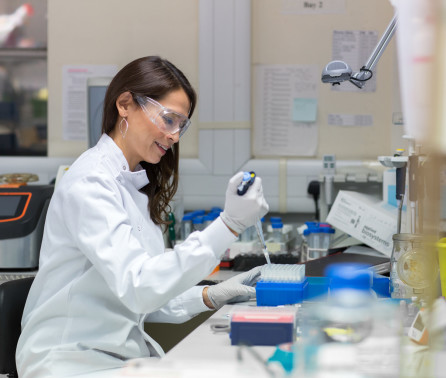Results
- Showing results for:
- Reset all filters
Search results
-
Journal articleRawson TM, Moore L, Castro Sanchez E, et al., 2020,
COVID-19 and the potential long term impact on antimicrobial resistance
, Journal of Antimicrobial Chemotherapy, Vol: 75, Pages: 1681-1684, ISSN: 0305-7453The emergence of the SARS-CoV-2 respiratory virus has required an unprecedented response to control the spread of the infection and protect the most vulnerable within society. Whilst the pandemic has focused society on the threat of emerging infections and hand hygiene, certain infection control and antimicrobial stewardship policies may have to be relaxed. It is unclear whether the unintended consequences of these changes will have a net-positive or -negative impact on rates of antimicrobial resistance. Whilst the urgent focus must be on allaying this pandemic, sustained efforts to address the longer-term global threat of antimicrobial resistance should not be overlooked.
-
Journal articleRawson TM, Moore LSP, Zhu N, et al., 2020,
Response to Dudoignon et al.
, Clin Infect Dis -
Journal articleRawson TM, Ming D, Ahmad R, et al., 2020,
Antimicrobial use, drug-resistant infections and COVID-19.
, Nature Reviews Microbiology, ISSN: 1740-1526 -
Journal articleRodriguez Manzano J, Moser N, Malpartida Cardenas K, et al., 2020,
Rapid detection of mobilized colistin resistance using a nucleic acid based lab-on-a-chip diagnostic system
, Scientific Reports, Vol: 10, ISSN: 2045-2322The increasing prevalence of antimicrobial resistance is a serious threat to global public health. One of the most concerning trends is the rapid spread of Carbapenemase-Producing Organisms (CPO), where colistin has become the last-resort antibiotic treatment. The emergence of colistin resistance, including the spread of mobilized colistin resistance (mcr) genes, raises the possibility of untreatable bacterial infections and motivates the development of improved diagnostics for the detection of colistin-resistant organisms. This work demonstrates a rapid response for detecting the most recently reported mcr gene, mcr−9, using a portable and affordable lab-on-a-chip (LoC) platform, offering a promising alternative to conventional laboratory-based instruments such as real-time PCR (qPCR). The platform combines semiconductor technology, for non-optical real-time DNA sensing, with a smartphone application for data acquisition, visualization and cloud connectivity. This technology is enabled by using loop-mediated isothermal amplification (LAMP) as the chemistry for targeted DNA detection, by virtue of its high sensitivity, specificity, yield, and manageable temperature requirements. Here, we have developed the first LAMP assay for mcr−9 - showing high sensitivity (down to 100 genomic copies/reaction) and high specificity (no cross-reactivity with other mcr variants). This assay is demonstrated through supporting a hospital investigation where we analyzed nucleic acids extracted from 128 carbapenemase-producing bacteria isolated from clinical and screening samples and found that 41 carried mcr−9 (validated using whole genome sequencing). Average positive detection times were 6.58 ± 0.42 min when performing the experiments on a conventional qPCR instrument (n = 41). For validating the translation of the LAMP assay onto a LoC platform, a subset of the samples were tested (n = 20), showing average detection times o
-
Journal articleRawson TM, Moore L, Zhu N, et al., 2020,
Bacterial and fungal co-infection in individuals with coronavirus: A rapid review to support COVID-19 antimicrobial prescribing
, Clinical Infectious Diseases, Vol: 71, Pages: 2459-2468, ISSN: 1058-4838BackgroundTo explore and describe the current literature surrounding bacterial/fungal co-infection in patients with coronavirus infection.MethodsMEDLINE, EMBASE, and Web of Science were searched using broad based search criteria relating to coronavirus and bacterial co-infection. Articles presenting clinical data for patients with coronavirus infection (defined as SARS-1, MERS, SARS-COV-2, and other coronavirus) and bacterial/fungal co-infection reported in English, Mandarin, or Italian were included. Data describing bacterial/fungal co-infections, treatments, and outcomes were extracted. Secondary analysis of studies reporting antimicrobial prescribing in SARS-COV-2 even in the absence of co-infection was performed.Results1007 abstracts were identified. Eighteen full texts reported bacterial/fungal co-infection were included. Most studies did not identify or report bacterial/fungal coinfection (85/140;61%). 9/18 (50%) studies reported on COVID-19, 5/18 (28%) SARS-1, 1/18 (6%) MERS, and 3/18 (17%) other coronavirus.For COVID-19, 62/806 (8%) patients were reported as experiencing bacterial/fungal co-infection during hospital admission. Secondary analysis demonstrated wide use of broad-spectrum antibacterials, despite a paucity of evidence for bacterial coinfection. On secondary analysis, 1450/2010 (72%) of patients reported received antimicrobial therapy. No antimicrobial stewardship interventions were described.For non-COVID-19 cases bacterial/fungal co-infection was reported in 89/815 (11%) of patients. Broad-spectrum antibiotic use was reported.ConclusionsDespite frequent prescription of broad-spectrum empirical antimicrobials in patients with coronavirus associated respiratory infections, there is a paucity of data to support the association with respiratory bacterial/fungal co-infection. Generation of prospective evidence to support development of antimicrobial policy and appropriate stewardship interventions specific for the COVID-19 pandemic are urgently requi
This data is extracted from the Web of Science and reproduced under a licence from Thomson Reuters. You may not copy or re-distribute this data in whole or in part without the written consent of the Science business of Thomson Reuters.
